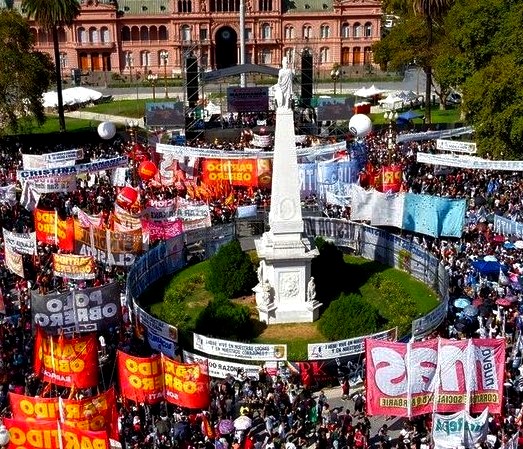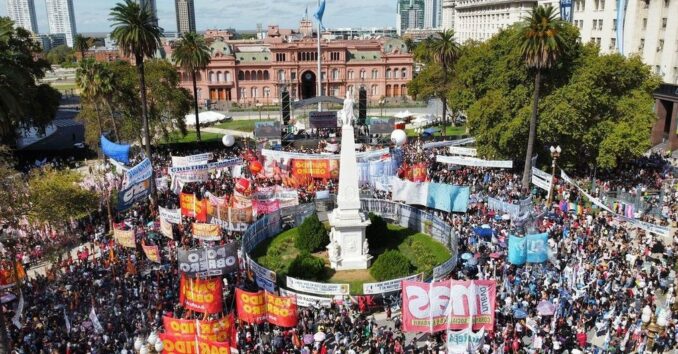

Four months after Javier Milei’s inauguration as president, Argentina’s crisis of leadership has worsened, with the working class suffering the worst poverty rate in 20 years.
Fed up by decades of government that failed working people, some of the public fell for Milei’s anti-establishment theatrics while on the campaign trail last year. The act bringing him most fame (or infamy) was waving a chainsaw back and forth during stump speeches.
Despite Milei’s earlier promises to cut corruption and wasteful spending since he took office on Dec. 10, the only thing Argentina’s “Chainsaw Man” has managed to slash is Argentina’s working class. And the workers have fought back, holding a one-day general strike in January and now preparing for another.


The annual protest against the Argentine military junta’s 1976 seizure of power turned into a protest of Javier Milei’s current presidency. Buenos Aires, March 24, 2024
Inflation and a poor economy had plagued Argentina even before Milei was installed in Casa Rosada (the Pink House). But things have gone from bad to worse, as inflation has given way to hyperinflation. With the price of basic goods having doubled or tripled, even items as simple as bus tickets and common food staples are now out of reach for millions of people.
The inflation rate hit 270% following a deliberate devaluation of the Argentine peso, pushing the majority of Argentine dwellers into crisis. According to a study done by the Catholic University of Argentina, more than 57% of the people now live in poverty, a 20-year high. (Reuters, Feb. 18)
The combination of rising poverty and declining social services is as deadly as it is intentional. In the Argentine people’s hour of need, the Argentinian government (which manufactured the crisis) has abandoned them.
Argentina boasts 38,000 Meal Centers, which until recently entitled citizens to a warm meal even when wages were down and prices up. One of Milei’s first acts as president was to end all federal assistance for this vital public service.
By now, the food warehouses are as empty as the bellies of the people.
Fighting back
Milei’s policies haven’t just hurt the economy in a broad or general sense. He has directly targeted a great number of people’s livelihoods. On April 3 of this year, Milei’s government proudly stated that it had eliminated 15,000 state jobs. That means 15,000 workers and their families have been suddenly deprived of a living.
If Milei continues to implement his program, and dismantles as many state ministries as he has promised, as many as 70,000 workers may lose their jobs. But they are not taking this threat lying down.
Government buildings and other workplaces across the country, in the capital Buenos Aires and beyond, have been stormed and occupied by throngs of Argentine citizens, mostly unfairly dismissed workers.
Members of the Association of State Workers (ATE) have dug their heels in for a fight. Demonstrators have gathered in defiance of the so-called “Acts of Intimidation” which Milei’s administration passed in an attempt to outlaw protests. ATE members rallied around the battle cry “Without workers there is no government, without (the) government there are no rights.”
ATE Secretary General Mercedes Cabezas said on April 3: “These layoffs have a face, they have a family, they have real needs in this context of great change and great poverty in Argentina. … The impact runs very deep because it’s combined with the reduction of social programs, so what we end up with is increasing poverty.” (Associated Press)
Protests continued through the weekend, culminating in a clash between riot police and demonstrators on April 5. ATE General Secretary Rodolfo Aguiar said that day: “We are not afraid of them. No matter how much they try to frighten and repress, we, the state employees, will not stop fighting back. You are the violent ones, the ones who govern against the constitution, with your backs to congress and harming all the people.” (Prensa Latina, April 5)
Ghosts from the past
Accusations that Milei is reminiscent of leaders from the fascist regimes of Argentina’s past are proving more relevant by the day. Milei’s sympathy for the 1974-83 military junta – which murdered 30,000 Argentines – is old news.
In 2023, prior to his election, Milei made his views quite clear. In one debate, he defended the military dictatorship, denying the scale of its atrocities, and dismissing the black-bagging and summary execution of countless Argentine citizens as mere “excesses.” Even before these outrageous comments, Milei’s stance on the regime was no secret.
Argentina’s military dictatorship was known for the brutal acts of terrorism it perpetrated against its own people. That period is known as the Dirty War. This terror campaign enlisted death squads to “disappear” and otherwise murder thousands of citizens, all in the name of anti-communism.
The Dirty War was part of Operation Condor, a U.S.-sponsored plot to assassinate and brutalize left-wing South Americans throughout the continent. The U.S. government supported this slaughter with tens of millions of dollars in aid and in arms.
Only when the dictatorship wound up in a confrontation with British imperialism over the Malvinas Islands (London calls this territory near Argentina the Falklands) did the U.S. abandon its Argentine client. That’s something Milei should remember if he expects Washington to stick by him should he lose his grip on the reins.
Trade unionists, college students, and Jewish Argentines were among those the generals targeted, along with all members of pro-revolutionary organizations. The victims were referred to as desaparecidos (the disappeared.) Their bodies were rarely found. Many were pushed from helicopters directly into the ocean.
This is the legacy Milei hopes to rehabilitate. But it goes deeper than that. According to the North American Congress on Latin America, which documents the history of the U.S. and Latin America, in the 1990s Milei served as an adviser for General Antonio Domingo Bussi. Bussi oversaw one of the most notorious campaigns in the Dirty War (Operation Independencia).
The father of Milei’s vice president, Victoria Villaruel, served as an officer under Bussi in that same operation. Later, Bussi would be found guilty of crimes against humanity.
It is no wonder, then, that the Milei administration has reacted with scorn to the remembrance demonstrations which took place this March 24. Every year, thousands of Argentinians gather in city squares to commemorate the disappeared, using slogans such as “Memory, Truth, Justice.”
This year, the atmosphere surrounding the event was different. The commemorations took a graver form than is normal. Typically, the state has not opposed them. Milei’s government, however, responded by releasing video propaganda attempting to sanitize the junta.
Despite the intimidation, the deployment of riot police, and the doubling down on austerity amidst rapidly increasing poverty, the Argentine people and labor movement are not slowing down. They are discussing another general strike, perhaps for the end of April, like the one that jolted Milei in January.
As part of Workers World newspaper’s coverage marking the 50th anniversary of the liberation of…
From the PFLP Central Media Office The following statement from the Popular Front for the…
Newark, New Jersey Over 250 people, representing over 250 New Jersey endorsing community groups, attended…
Special to Workers World The following is a press release issued on April 24, 2025,…
dear Larry Krasner, we heard you sued Elon Musk over his corrupt million election giveaways…
Unions join forces against harassment and deportation of members When 200 immigrant workers – from…